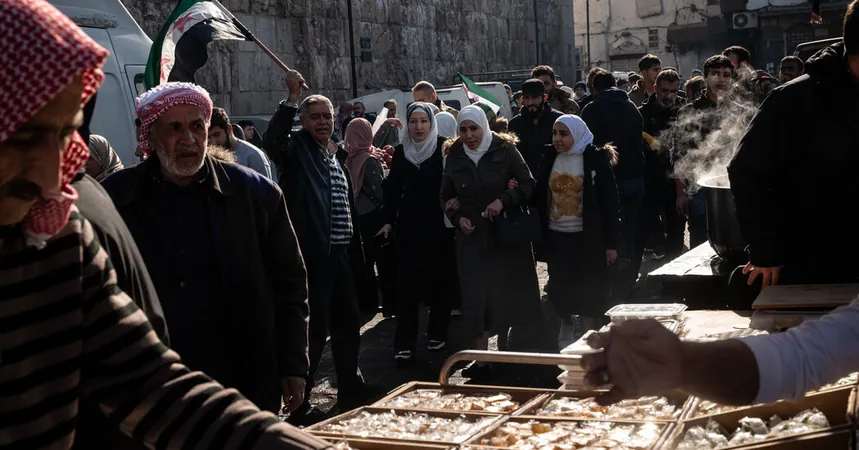
Will Lifting Sanctions Revive Syria's Crippled Economy?
2024-12-21
Author: Lok
Introduction
As the dust settles following the rapid collapse of President Bashar al-Assad’s regime, Syria faces an uphill battle in its economic recovery. With nearly 14 years of civil war and political repression teetering on chaos, the nation now finds itself with shattered infrastructure, rampant poverty, and a staggering inflation rate that has nearly obliterated the value of the Syrian pound. Current estimates reveal that over 90% of the Syrian populace now lives below the poverty line, a grim statistic reflective of the ongoing humanitarian crisis.
Economic Landscape Pre and Post War
Before the onset of war, oil exports constituted around two-thirds of Syria's revenue, and agricultural production accounted for roughly 25% of the economy. In stark contrast, recent reports indicate that the country’s most profitable 'export' is now captagon—an illegal, highly addictive amphetamine that has become a lucrative venture for a politically linked elite. This alarming transformation has created a dysfunctional economic landscape. As noted by economist Samir Aita, “The whole economic system in Syria is not functioning.”
Political Challenges and External Factors
Ahmed al-Shara, who now leads the opposition coalition, faces the monumental task of stabilizing the area: unifying disparate rebel factions, reestablishing governance, restoring law and order, and delivering essential services like water distribution. Yet, a critical step towards revitalizing Syria’s economy may lie outside its borders—in Washington. There’s a growing consensus among economists and political analysts that the lifting of U.S. sanctions is essential for economic renewal.
Impact of Sanctions
Sanctions—particularly those implemented in 2019—were aimed at punishing the Assad regime but have inadvertently stifled the economic prospects of the entire nation. Families are unable to send financial assistance, refugees can’t access their Western-held assets to invest in their homeland, and international financial institutions like the IMF and World Bank have been rendered powerless to assist.
The Need for Reconstruction Investment
To truly kick-start the rebuilding process, experts argue that the removal of sanctions, including the terrorist designation imposed on al-Shara and his organization, Hayat Tahrir al-Sham, is imperative. The U.S. may consider leveraging this as a bargaining chip in negotiations. However, al-Shara’s past affiliations with extremist groups complicate his ability to operate effectively as a leader.
Economic Hurdles
Recently, Geir Pedersen, the UN’s special envoy for Syria, remarked on the encouraging rhetoric from rebel leaders about forming a government committed to unity and inclusivity. But significant economic hurdles remain.
Oil Production Decline
Oil production, which once provided half of Syria’s revenue, has dwindled from about 383,000 barrels per day to less than 90,000, according to World Bank estimates. With infrastructure ravaged and existing wells primarily in Kurdish-controlled regions, restoring this sector will require investment and expertise that are currently in short supply. “Attracting foreign companies capable of reconstruction is a colossal challenge,” stated Joshua Landis, co-director of the Center for Middle East Studies.
Return of Refugees
Moreover, any meaningful recovery would need to entice the eight million Syrian refugees who fled amidst the violence to return. Many educated and skilled Syrians are hesitating, deterred by the lack of reliable electricity or an established rule of law. Dr. Landis emphasized that “Syrians with money are key to recovery,” yet security concerns loom large.
Regional Influence and Interest
Syria’s neighboring countries also have vested interests in a stable and recovering Syria. Turkey, sharing the largest border with Syria and hosting over three million refugees, is particularly positioned to influence the rebuilding process. Turkish President Recep Tayyip Erdogan has previously backed rebel factions and may seek to extend his influence by securing reconstruction contracts, leveraging relationships within Turkey’s construction industry.
Conclusion
While there is hope for economic resurgence, the road to recovery appears steep. The future of Syria’s economy hinges on the ability of the Damascus government to establish legitimacy and rebuild trust among its citizens, as well as navigate the complex international landscape where sanctions, political alliances, and humanitarian needs intersect. In a country mired in chaos, will lifting sanctions be the game-changer needed for a brighter future? Only time will tell.


 Brasil (PT)
Brasil (PT)
 Canada (EN)
Canada (EN)
 Chile (ES)
Chile (ES)
 España (ES)
España (ES)
 France (FR)
France (FR)
 Hong Kong (EN)
Hong Kong (EN)
 Italia (IT)
Italia (IT)
 日本 (JA)
日本 (JA)
 Magyarország (HU)
Magyarország (HU)
 Norge (NO)
Norge (NO)
 Polska (PL)
Polska (PL)
 Schweiz (DE)
Schweiz (DE)
 Singapore (EN)
Singapore (EN)
 Sverige (SV)
Sverige (SV)
 Suomi (FI)
Suomi (FI)
 Türkiye (TR)
Türkiye (TR)